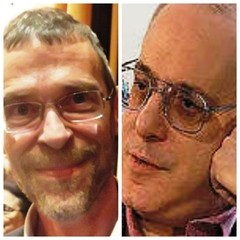|
Back
A Happy Homage and a Simian Simulacrum New York
Elebash Recital Hall, CUNY Graduate Center
10/12/2017 -
Mechanistic Music in Honor of Paul Zukofsky:
Charles Ives: Impression of the “St. Gaudens” in Boston Common
Josef Matthias Hauer:Zwölftonspiel
Igor Stravinsky: Sonata for Two Pianos
Craig Pepples: Monkeys at Play (World Premiere)
Erik Satie: Cinema from Relâche (Arranged by Darius Milhaud)
Aaron Likness, Andrew Zhou (Pianos)

G. Pepples/P. Zukofsky (© Samuel A. Dog/Discogs)
“He insisted he did not play contemporary music; he played good music.”
Craig Pepples on Paul Zukofsky
The only unforgivable error tonight was labeling this a “memorial concert” for Paul Zukofsky, who died this year at the age of 74. His life, as violinist, conductor and writer, had apparently been filled with so much light–from performing for Ezra Pound at the age of 11 to introducing works by Babbitt, Cage, Carter, Glass, Feldman etc etc throughout his career–that laments and obsequies were out of the question.
(In fact, Mr. Zukofsky’s joy in new composers was the opposite of Jascha Heifetz, who sighed, “I occasionally play works by contemporary composers, mainly to discourage the composers from writing any more.”)
Thus, a few months before his death, Mr. Zukofsky, with the help of his frequent collaborator, Ursula Oppens, arranged the music to be played after his death. And not a hint of a requiem or chorale. Rather, duo-pianists Aaron Likness and Andrew Zhou, performed five works from 1915 to 2013 that breathed ebullience and energy.
Plus to augment the occasion, we didn’t have either the usual program notes or–oh, that dreary dreary word–“an appreciation”. Instead the concert book re-published Paul Zukofsky’s own article on Erik Satie, poems by Charles Ives and Zukofsky’s famous father,comments by Mr. Pepples, and a truncated bibliography of Zukofsky’s own writings.

A. Zhou, A. Likness (© Samuel A. Dog)
The music, though, was the thing. And from the start this music needed to breathe Mr. Zukofsky’s own radiance, starting with a rare work by another ebullient figure, Charles Ives.
Unlike his fellow Americans, Ives never took much interest in “ethnic” music. He was New Englander through and through. Which did not prevent him from feeling pain and poetry when seeing the memorial to African-American soldiers fighting in the Civil War. It inspired Ives’ poem (MOVING–Marching–Faces of Souls) and the first movement of his Three Places in New England.
The piano version, played by Aaron Likness, started with brooding chords, and inevitably branched out into Ives’ non–pasquinade of supposed spirituals (Old Black Joe was by New York-born Stephen Foster), reveille and Marching Through Georgia, before descending into, what Ives called, “The Black March”.
The next work and the next composer were completely unknown to me, and at first I thought Josef Matthias Hauer’s Zwölftonspiel (“Twelve-tone play”) was the later Satie. Hauer had apparently invented a non-Schoenbergian dodecaphonism.
In Paul Zukofsky’s own words, quoted by Pebbles: “Nothing could be further from Schoenberg with is dictum: not too fast, not too slow, not too loud, not too soft; well-tempered and well-intoned.”
And well played Messrs Likness and Zhou on one piano. “Play” being the operative word. Perhaps some of his thousand-odd short works were more atonal, more cerebral. This untitled piece came out of a circus. It was jolly, played with great taste by the two. Perhaps one could spot the 12-tone scale here, but it escaped me. It was simply light music.
They went to separate keyboards for Stravinsky’s Sonata for Two Pianos for good reason. The Russian was obviously searching for his contrapuntal roots, and one needed space for the four hands. Likness and Zhou were well attuned to each other. Perhaps too well attuned. Theirs was a perfection which became a tiny bit dreary. Not out of place, but more mechanical than melodious. (I was reminded of Hamelin and Andsnes doing the Two Piano Concerto last year, where they went their own way, and made it more interesting.)
The last work was Cinema from Satie’s Relâche, arranged by Darius Milhaud and sounding very much like Milhaud himself. Galloping rhythms, more “plagiarisms” than even Ives used, and the happiest of ending.
Yet I cannot neglect the one world premiere–and one of the most splendid two-piano works I’ve heard in years–composer/annotator Craig Pepples’s Monkeys at Play. One would have expected a Saint-Saëns-style mini-movement. But one would have been totally off course both in style and length
Monkeys at Play did start off with the two pianists bouncing a few notes off each other. Sometimes a single note, sometimes a discordant chord. Inevitably, the few notes turned into a dueling arpeggios, though never systematic arpeggios. (After all, we’re speaking of monkeys, not Mozarts.)
The arpeggios became more clustered, more dissonant, they became frantic and loud and very soft (even monkeys have to sleep), then started up again. Over perhaps 20 minutes, the two pianists scrambled and fought through forests of chords, swamps of single notes, and for long intervals, the two pianists played in thick, massive swirls of counterpoint, before returning to their tangled antics.
On a musical note, I was totally fascinated by the apposition, inventiveness, so complex and so transparent creation here. (On a personal note, living in Asia, I grew to loathe gibbons and their ilk, so Mr. Pepples’ music lifted that fog of bad blood.)
And for those who tire of two-piano music, like the tiring Glass Concerto for the Labèque sisters, Mr. Pepples should become the highlight of any duo-piano recital.
I never met Paul Zukofsky, yet many in this audience knew him and had worked with him and I was anxious to hear their own comments. No dissension here. It was all too obvious that Mr. Zukofsky had enjoyed choosing his own selections, and was equally evident that, even without his fiddle, he might have had the last expressive smile.
Harry Rolnick
|